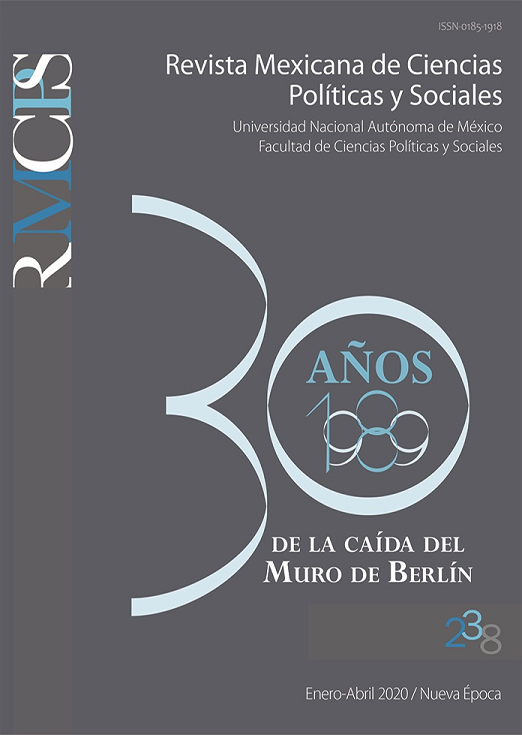Thirty Years after the Fall of the Berlin Wall: Reflections on Contexts and Textures of Memories and Nostalgias in Europe
Main Article Content
Abstract
Downloads
Article Details
Citas en Dimensions Service
References
Aleksiévich, Svetlana (2015) El fin del “Homo sovieticus”. Barcelona: Acantilado.
Amer, Karim y Jehane Noujaim (2019) Nada es privado [The great hack]. Estados Unidos: Netflix.
Atwood, Margaret (2017) El cuento de la criada. Barcelona: Salamandra.
Aubenas, Florence (2011) Los muelles de Ouistreham. Barcelona: Anagrama.
Baricco, Alessandro (2019) The Game. Barcelona: Anagrama.
Bauman, Zygmunt (2001) La globalización. Consecuencias humanas. Ciudad de México: FCE.
Bauman, Zygmunt (2016) Extraños llamando a la puerta. Barcelona: Paidós.
Bauman, Zygmunt (2017) Retrotopía. Ciudad de México: Paidós.
Blomkamp, Neill (2013) Elysium. Estados Unidos: Alphacore/Media Rights Capital/QED International.
Bokser, Judit (2004) “La cuestión judía hoy: del ¿socialismo de los tontos? A la recurrencia del prejuicio” Metapolítica (especial): 212-219.
Boym, Svetlana (2015) El futuro de la nostalgia. Madrid: Antonio Machado Libros.
Brooker, Charlie (2011) Black Mirror. Reino Unido: Channel 4/Netflix.
Caño Tamayo, Xavier (2019) “Los muros de la vergüenza. Mil kilómetros de Europa contra migrantes y refugiados” Nueva Tribuna, 21 junio.
de Vries, Catherine E. e Isabell Hoffmann (2018) The Power of the Past. How Nostalgia Shapes European Public Opinion. Alemania: Fundación Bertelsmann Stiftung.
El País (2019) “Resultado de las elecciones europeas por país”. 28 mayo.
Eribon, Didier (2015) Regreso a Reims. Buenos Aires: Libros del Zorzal.
Ernaux, Annie (1983) La place. París: Gallimard.
Fernández, María (2016) “Un nuevo mapa de la desigualdad en la Unión Europea” El País, 4 diciembre.
Furet, Francois (1995) El pasado de una ilusión. Ciudad de México: FCE.
Gaston, Sophie y Sacha Hilhorst (2018) At Home in One’s Past. Nostalgia as a Cultural and Political Force in Britain, France and Germany. Londres: Demos.
Goldhagen, Daniel (1997) Los verdugos voluntarios de Hitler. Los alemanes corrientes y el Holocausto. Madrid: Taurus.
Houllebecq, Michel (2018) Serotonina. Barcelona: Anagrama.
Huyssen, Andreas (2002) En busca del futuro perdido. Cultura y memoria en tiempos de la globalización. Ciudad de México: FCE.
Informe del Secretario General de Naciones Unidas (2017) Cumplir la promesa de la globalización: promover el desarrollo sostenible en un mundo interconectado, 8 agosto.
Jablonka, Ivan (2017) Laetitia o el fin de los hombres. Barcelona: Anagrama.
Judt, Tony (2006) Postguerra. Una historia de Europa desde 1945. Ciudad de México: Santillana.
Le Carré, John (1985) El espía que surgió del frío. Ciudad de México: Editorial Artemisa.
Le Carré, John (2018) El legado de los espías. Barcelona: Planeta.
Loriga, Ray (2017) Rendición. Madrid: Alfaguara.
Mathieu, Nicolas (2019) Sus hijos después de ellos. Madrid: Alianza editorial.
Matos Franco, Rainer (2018) Limbos rojizos. La nostalgia por el socialismo en Rusia y el mundo poscomunista. México: El Colegio de México.
Morozov, Evgeny (2019) “La Red nunca fue un paraíso” El País, 6 mayo. Ideas.
Nacach, Pablo (2019) Ver y maquinar. La emergencia de una nueva sensibilidad. Barcelona: Anagrama.
Nolan, Jonathan y Lisa Joy (2016) Westworld. Estados Unidos: HBO Entertainment/Kilter Films/Bad Robot Productions/Jerry Weintraub Productions/Warner Bros. Television.
OCDE (2017) Comprendiendo la división socioeconómica en Europa del 2017.
Pellicer, Lluís (2019) “Desigualdad en la Unión Europea. La brecha entre norte y sur ha crecido en los últimos 15 años” El País, 5 abril.
Pretelin Fausto (2018) “El boom de la economía polaca” El Economista. 30 de septiembre.
Rodríguez, Jesús (2017) “Guerra 3.0” El País, 12 febrero.
Rojas, Rafael (2018) “Nostalgia por el comunismo” La Razón, 22 diciembre.
Schwochow, Christian (2014) La calle Bornholmer [Bornholmer Strasse]. Alemania: Babelsberger UFA Fiction.
Spielberg, Steven (1993) La lista de Schindler [Schindler’s List]. Washington D. C.: Amblin Entertainment.
Spielberg, Steven (2002) Minority Report. Estados Unidos: Amblin Entertainment/Cruise/Wagner Productions.
Traverso, Enzo (2018) Las nuevas caras de la derecha. Buenos Aires: Siglo XXI.
Vega Iracelay, Jorge (2017) “De la ciencia ficción a la realidad” Nexos, abril.

La Revista Mexicana de Ciencias Políticas y Sociales publicada por la Universidad Nacional Autónoma de México se distribuye bajo una Licencia Creative Commons Atribución-NoComercial-SinDerivar 4.0 Internacional.
Basada en una obra en http://www.revistas.unam.mx/index.php/rmcpys/
La RMCPyS autoriza a sus colaboradores que suban una copia de sus trabajos publicados en sus webs personales o en cualquier repositorio de acceso abierto, siempre y cuando se mencione específicamente a la Revista Mexicana de Ciencias Políticas y Sociales como fuente original de procedencia, citando el año y número del ejemplar respectivo y añadiendo el enlace a la página web donde este órgano editorial puede ser consultado in toto, de manera abierta y gratuita en: <www.revistas.unam.mx/index.php/rmcpys>.
Las y los lectores tienen libertad para:
Compartir, copiar y redistribuir el material en cualquier medio o formato.
El licenciante no puede revocar estas libertades en tanto usted siga los términos de la licencia.
De acuerdo con los siguientes términos:
- Atribución: la/el lector/a debe reconocer el crédito de una obra de manera adecuada, proporcionar un enlace a la licencia, e indicar si se han realizado cambios. Puede hacerlo en cualquier forma razonable, pero no de forma tal que sugiera que tiene el apoyo del licenciante o lo recibe por el uso que hace.
- No comercial: la/el lector/a no puede hacer uso del material con fines comerciales.
- Si se mezcla, transforma o se desarrolla a partir de la obra licenciada, no se permite la distribución del material modificado.
Cargos por gestión de artículos
La Revista Mexicana de Ciencias Políticas y Sociales NO cobra tarifas por recibir, procesar o publicar los artículos (Article Processing Charge [APC]) enviados por los autores.





